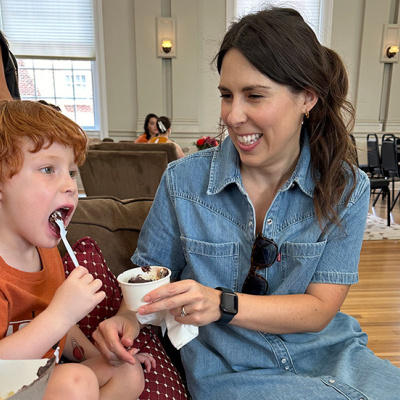Young Thespians Grow at UT's Camp Shakespeare

Fog still shrouds the farmlands of Fayette County when the young players of Camp Shakespeare roll off their cots and begin their day.
There is not much time for sleepy-eyed stumbling; the sun is just now warming the rolling countryside surrounding the Briarfield B&B near Warrenton, and that means it’s time for pre-breakfast line work. The words of Shakespeare, spoken by young people who hail from Austin and Gonzales and New York City, mingle with birdsong and the sound of the occasional pickup truck heading down nearby Texas 237.

“This castle hath a pleasant seat...”
“O horror, horror, horror....”
“Knock, knock – who’s there, i’ th’ name of Beelzebub?”
Inside the bed and breakfast’s main meeting room, a white-haired professor emeritus who began teaching at UT in 1964 sits and squints through his eyeglasses at a line of text in a bound copy of Macbeth.
James "Doc" Ayres, founding director of UT’s Shakespeare at Winedale program and its leader for 30 years, holds a copy of the play in one hand and his styrofoam cup of coffee in the other. Before him stands a 15-year-old from Houston who, with her shiny blond ponytail and shy smile, is by nature about as far from the dark-hearted Lady Macbeth as one can get.
“It’s not just that you’re giving orders to someone,” Ayres tells the young woman in response to her first performance of Lady Macbeth’s incantation early in the play. He suggests she take her time with the words. “You’ve got to have the power and meaning behind them. The words are charmed.” She nods and gives it another go.
Seven hours later, in the full heat of a Texas summer afternoon, the entire camp team–Ayres, two beloved longtime counselors now in their late 20’s, and two interns who are former campers themselves–is standing in the Winedale Theater Barn at the UT Winedale Historical Center, watching intently as that early morning work pays off and Lady Macbeth kneels on the wooden stage to issue a chilling call for assistance from evil spirits:
“Make thick my blood;
Stop up the access and passage to remorse....”
Astonishingly, this moment is about the halfway point of a typical day at Camp Shakespeare, a two-week residential camp that is offered in two sessions each summer. Before it’s lights-out time in the cabins and an appropriately creepy almost-full moon peeks over the pines and oaks, these 14 players, ages 11-15, will have also written in journals, pored over lines while resting out of the heat for a bit, improvised in a group jam session to create the two songs to be performed in the play, discussed the day’s work, and created improvised playlets together after dinner.

And then they will wake up the next morning and say “yes!” to all of this and more again.
“It’s about building an ensemble, building an environment for productive play,” says intern Austen Hyde, a former camper and now a sophomore at Brown University. “It’s about discovering opportunities in the words to make them come alive, and discovering through the words opportunities to make yourself come alive in ways you never have before.”
This is the 10th summer of Camp Shakespeare, which was begun by Ayres–known as “Doc” to generations of students–shortly after he handed over the reins of the Shakespeare at Winedale summer course to his former Winedale student James Loehlin in 2000. This summer 82 young people applied for the 28 positions available in the two sessions. Session One culminated in three performances of Much Ado About Nothing.
Gabe Colombo, 15, says Camp Shakespeare has changed him.
“Saying ‘yes’ is one foundation for everything we do at camp,” Colombo says. “It has taught me to say ‘yes’ to so much more in my life.”
The focus is on process over product, and with high standards in place, every moment counts–which can work transformations nearly as miraculous as those in Shakespeare’s plays.
“I have parents write, and they talk about how their kid has grown in so many ways,” says Ayres. “They’re doing better at school, they’re more focused, more confident, they’re making better decisions–and all of that happens through working with other people on the play … It’s a play experience, and what the kids do, it’s joyful, even if the play is a tragedy. In the end they think they have done something no one else could do. And I agree with them.”
Photos by Caroline Poe






